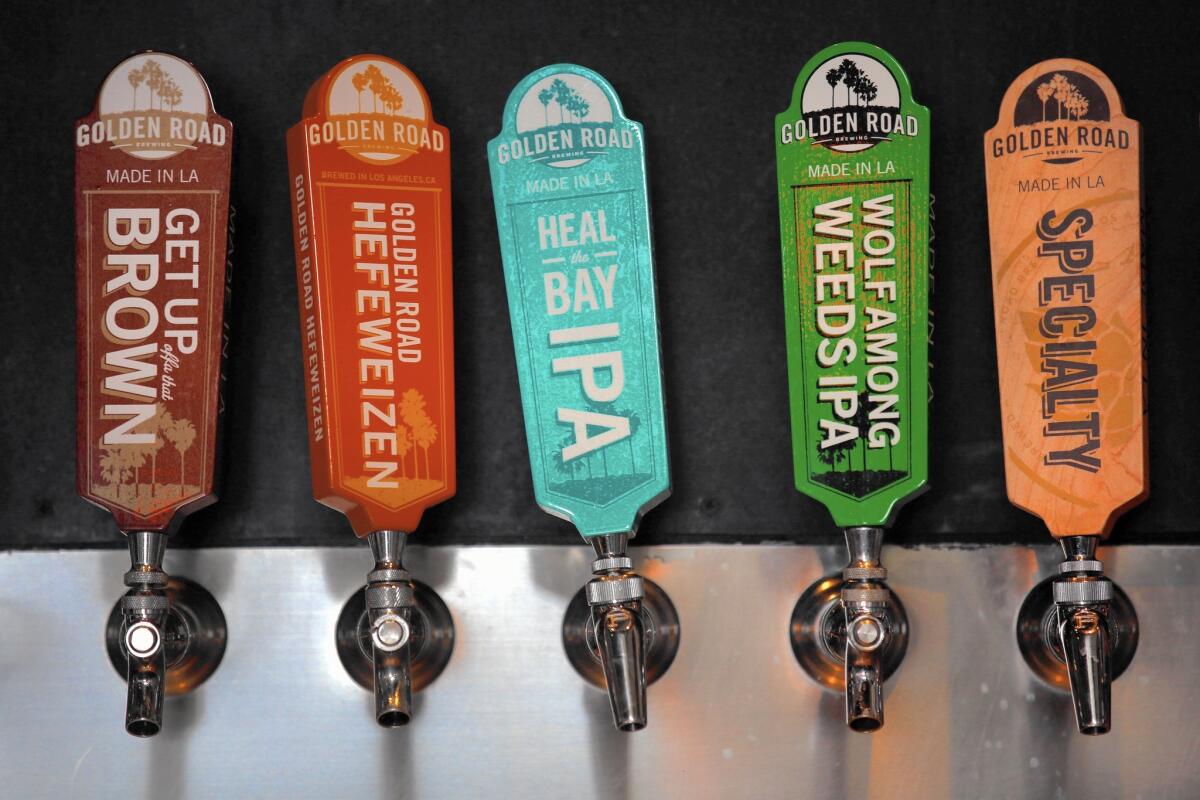Craft brews are in great demand, and so are the breweries

Beer taps at L.A.âs largest craft brewer, Golden Road Brewing, which was recently acquired by Anheuser-Busch.
Eagle Rock Brewery started off as a father and sonâs home-brewing hobby. Now the popular Los Angeles craft brewer is one of the best-known brands in Southern California.
The brewery has doubled production nearly every year since opening in 2009. Demand for Eagle Rockâs India pale ales and sour beers, the trendy tart twist on traditional brews, has pushed the companyâs equipment and facility to their limits.
With booming sales have come a parade of eager corporate suitors, including private equity firms and business brokers, but so far Jeremy Raub has turned them all down. He sees his brewery, which he owns with his wife and his father, as more than a business. Heâs proud of its role in helping to create the greater Los Angeles beer community.
âWeâve felt the pressure,â he said. âInstead of listening to the pressure from the industry and whatâs happening around us, weâre just listening to our customers and the community and growing based on that.â
Like several other Southern California brewers, Raub gets multiple offers each year from investors who want to buy his brewery and cash in on the growing demand for craft beer.
Last month, several popular California craft breweries either were acquired by or announced partnerships with large beer corporations. First, Lagunitas Brewing Co. said Heineken had taken a 50% stake. Days later, San Diego-based Saint Archer Brewing Co. was acquired by beer behemoth MillerCoors. Most recently, L.A.âs largest craft brewer, Golden Road Brewing, announced that it had been acquired by Anheuser-Busch InBev.
And more deals â with huge payoffs â could follow, but brewery owners must also grapple with customer backlash against them âselling outâ and giving up a measure of control over a company theyâve nurtured.
âI think we are in a particular window where people understand there are still tremendous market opportunities out there that wonât last forever,â said Bart Watson, chief economist for the Brewers Assn., a trade group for craft brewers. âGrowing a business is expensive, so many small brewers that are growing rapidly and taking on a lot of debt are looking to finance.â
The flurry of deals comes as craft beer continues to outperform the overall U.S. beer market, where it makes up 11% of volume. In California alone, there are nearly 600 craft breweries, the most of any state, according to the California Craft Brewers Assn. Growth has been especially robust in Los Angeles County, where the number of craft breweries and brew pubs has ballooned to more than 30 from just a handful in 2010. More are expected to open in the next six months.
Experts say consumers like the story behind these craft brews â who made it and how â as well as the wide variety of flavors and styles. The beer behemoths have taken notice and tried to offset the decline in their core brands by taking on successful craft brewers with expertise in their local markets, said Philip Gorham, senior equity analyst at Morningstar.
âItâs about economics, but also an intangible piece,â he said. âTheyâre buying the experience of people who have been successful in craft.â
Acquisitions have become more common in the beer industry as consumers flock to craft brands and turn away from mainstream stalwarts. One way to deal with the potential profit erosion from craft competitors is to buy corporate rivals. Last month, AB InBev approached SABMiller with a takeover offer, a deal that would unite the two largest brewers in the world. The beer brewing giants are still haggling over terms of the potential merger.
AB InBev has already taken on several well-known brewers in areas with a tradition of craft brewing: Chicagoâs Goose Island Beer Co., New Yorkâs Blue Point Brewing Co., Oregonâs 10 Barrel Brewing Co. and Washingtonâs Elysian Brewing Co. When it seemed like its next big brand would be coming out of California, Golden Roadâs Meg Gill decided that she wanted her brewery to fill that spot.
She contacted AB InBev after learning that airlines were carrying Goose IPA, a sign that the beer corporation was noticing the IPA trend. At first she didnât consider selling, but in the end she decided the best way to get her beer to more people was to work with AB InBev.
âOur brewers will continue to want to learn and improve,â Gill said. âWe have the backing that will speak to that.â
That backing comes with a price. Microbreweries that sell to beer giants may still have the same story and beer that won them fiercely loyal customers, but once an acquisition is announced those same consumers have sometimes lashed out on the Internet and accused artisan brewers of âselling out.â â#SaintArcher is now officially dead to the craft beer industry. #SellOut,â one Saint Archer fan tweeted after MillerCoors bought the company.
Gill of Golden Road doesnât see it that way.
âItâs not actually a sellout, from my perspective,â Gill said of her deal with AB InBev. âWe believe in this strategic vision they have of craft beer.â
Watson, of the Brewers Assn., emphasized that the recent acquisitions involve just a few of the thousands of craft brewers across the country, many of which have remained independent, though not for lack of offers.
Over the years, the Lost Abbey in San Marcos, Calif., has won a number of awards for its beers, most recently a gold medal at the Great American Beer Festival for one of its barrel-aged sour brews. And like many brewers in the San Diego area, co-founder Tomme Arthur has had his share of meetings with potential buyers.
The brewery is not looking to sell, but Arthur said heâll always hear out the suitors.
âWeâre really focused on the day-to-day operations and absolutely remaining as independent as we can,â he said.
The brewery has already stymied its own expansion to keep its independence.
Just three years after opening in 2006, the company had grown by 35%, a rate that the brewery team knew would be impossible to sustain. The brewery hit the brakes, choosing to slow its growth, Arthur said.
âWe had a very definitive vision when we opened our doors about how the place would operate,â he said. âWeâve been able to execute that because thereâs no outside pressure on us to behave a certain way or grow at a rate we donât like.â
Laurie Porter, owner of Torrance-based Smog City Brewing Co., said people often advise her to expand the brewery. The pressure to grow her brand has become especially intense as sales of craft beer continue to increase and other breweries grow year after year. Porter said Smog City will wait out the boom and see what happens next.
âWe went into the craft industry knowing we wanted to be our own bosses,â she said. âUltimately, if you have a high-quality product and a brand that you put your energy and passion behind, all that growth can happen, but it will take longer.â
Raub, of Eagle Rock Brewery, compared the intense interest in craft beer to the dot-com boom of the 1990s. Though he, his wife and his father have talked about some of the offers theyâve received, theyâve never really been interested in a takeover, he said.
âThe idea of selling this business and doing something else, itâs not really appealing,â Raub said. âItâs a lifestyle. This is what we set out to do.â
Twitter: @smasunaga
More to Read
Inside the business of entertainment
The Wide Shot brings you news, analysis and insights on everything from streaming wars to production â and what it all means for the future.
You may occasionally receive promotional content from the Los Angeles Times.











